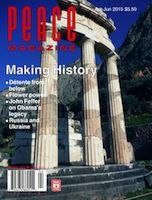
Peace Magazine Apr-Jun 2015, page 25. Some rights reserved.
Search for other articles by Yossef Ben-Meir here
How can Morocco’s farming families overcome subsistence practices that trap them in poverty?
Fortunately, in the areas of greatest poverty there are also numerous indigenous tree and plant varieties that flourish without pesticides or other chemicals: fruit trees such as walnut, pomegranate, olive, lemon, fig, carob, date and almond, as well as medicinal and aromatic plants such as capers, lavender, mint, oregano, rosemary, sage and thyme. A government agency “Waters and Forests” lends land on which community tree nurseries have been established. Many such nurseries must be created to generate the billion plants required to end the cycle of poverty. But farming families worry about the risk of switching from the traditional barley and corn crops that keep them in poverty to more lucrative cash crops.
Waters and Forests’ loans of land allays these concerns since the farmers do not lose the use of their arable land for the two years while trees and plants mature from seed.
Currently successful pilots can now be expanded to 600 possible sites throughout the Kingdom. The Jewish community of Morocco, with about the same number of potential sites, may contribute land for community nurseries.
The cultural background to this is unique to Morocco, where both Muslims and Jews venerate saints. Hundreds of Jewish persons are buried in isolated rural holy sites. Since the diminution of the Jewish population in Morocco during the last century, that tradition has been upheld with the support of the Moroccan government and people, though these sacred sites require costly maintenance.
Such cemeteries often have arable land attached to them—originally to be used to pay for the upkeep of the sites. Because the Jewish population has decreased so much, that land is unused. The pilot site for what is essentially an intercultural initiative involves the creation of tree nurseries on this Jewish-maintained land for the benefit of local Muslim farming communities.
Near Marrakesh. 30,000 trees have already been raised and distributed from the nursery. Seven such parcels of land have now been made available for loan.
Morocco is celebrating the kingdom’s mosaic of cultures while simultaneously advancing human development goals. It may be the only country where local Muslim and Jewish collaboration is leading to the creative use of cultural resources.
Dr. Yossef Ben-Meir is president of the High Atlas Foundation, a Moroccan-US NGO that has planted one million trees in Morocco with community partners.

Peace Magazine Apr-Jun 2015, page 25. Some rights reserved.
Search for other articles by Yossef Ben-Meir here